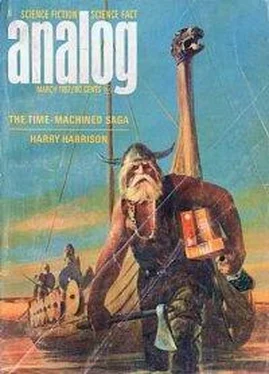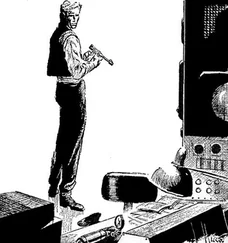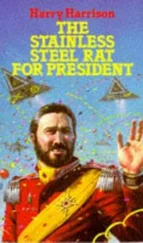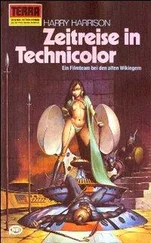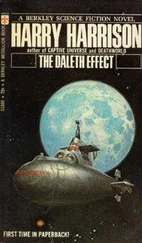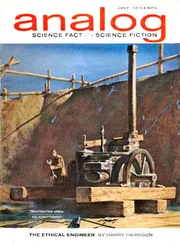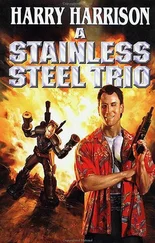“Hananu! Sidustu handartökin, ” [18] “Come on! The last bit of work.”
Ottar roared, and his men shouted back happily as they ran to swing the ship about for the last leg of her voyage. Barney retreated to the aft deck so he wouldn’t be trampled in the rush of activity. The seamen were shifting the beitass pole and the women screamed as they scattered out of the way, while the tethered sheep could only protest noisily when they were kicked aside. The crowded deck area resembled a seething farmyard, with the torn-open bundles of fodder and frightened livestock. In the middle of all the hubbub one of the women was hunkered over milking a cow into a wooden bucket. When the ship turned, the wind carried the odor of the bilges to Barney and the barnyard resemblance was even more apparent.
Once they were under way things settled down and even the animals returned quietly to their feed. The following wind not only filled the sail but it drove most of the odors ahead of the ship and the air on the rear deck was fresh and clear. The cutwater at the bow hissed through the long Atlantic swells, churning up a rounded, foaming bow wave that rushed along the sides of the ship. Riding light as a cork over the sea, the knorr was a graceful and practical vessel, at home in her true element.
“Land looks good,” Ottar said, steering with a light touch on the tiller bar, as he pointed with his free hand toward the shore, where large trees and patches of meadow were beginning to appear.
“Wait until you get around the point,” Barney told him, “it’s even better there.”
They were passing the islands that stood outside the bay and the animals caught the scent of the fresh grass and set up a clamor. The bull, hobbled and tied, pulled at its rope and bellowed and the women were shouting with joy while the men were singing. The voyage was coming to an end and the landfall was a good one. Even Barney felt the excitement as Epaves Bay opened up before them, with the tall trees rising up the hills to the blueness of the skies, and the fresh spring green of the grass meadows by the stream. Then he picked out the dark spot of his cameraman and the jeep on the slope and he remembered the film. He knelt behind the bulwark and stayed low and out of sight as he pulled himself over to a homed Viking helmet that was tied by a thong to a hole in one of the timbers. Only when this was settled clammily on his head did he raise up high enough to be seen from shore.
Ottar was driving the ship at full speed toward the mouth of the stream and all aboard were shouting with excitement. The knorr scraped the sandy bottom, was lifted clear by a wave and carried forward, then touched bottom again and shuddered to a halt. Without bothering to lower sail, the crew and passengers were leaping into the surf and wading ashore, laughing with joy, splashing through the stream and into the meadow beyond. Ottar tore up a great handful of the knee-high grass, smelt it, then chewed a bit of it. Some of the others were rolling on the ground, taking an animal pleasure in the solid earth after all the days aboard the ship.
“Great!” Barney shouted, “absolutely great. The landing in Vinland after months at sea, the first settlers in the new world. A great shot, a great historical shot.” He made his way through the frenzied animals to the bow and stood up where he could be seen by the cameraman and waved his arm in a come-on motion. “That’s enough of that,” he shouted. “Get down here.”
His voice couldn’t carry but the gesture was unmistakable. Gino stood up from behind the camera and waved back, then began to load the camera into the jeep. A few minutes later it churned along the beach and Barney jumped down from the ship and ran to meet it.
“Hold it,” he called to Dallas, who was driving. “Swing around and get up on that bank there, directly opposite the stream. Gino, set the camera up on the top so we can get a head-on shot of the ship coming in, people running off, right into the camera, streaming by on both sides.”
“Absolutely a tremendous picture,” Gino said, “the way they came out of the ship. Give me ten minutes.”
“You got it. It’ll take longer than that to set the shot up again. Hold it,” he ordered Dallas, who was starting to swing the jeep around. “I want your bottle.”
“What bottle?” Dallas asked, with open and innocent eyes.
“The bottle you always got with you, come on. A loan, you’ll get it back later.”
The stunt man reluctantly produced a black-labeled, one-quarter-empty bottle of whiskey from under the seat.
“Well, well,” Barney said coldly. “Been getting into the private stock.”
“I ran out, an accident, I’ll pay it back.”
“And I thought I had the only key to this stuff. The things the Army taught people! Get moving.” He stuck the bottle inside his jacket and walked back to Ottar, who was kneeling by the stream and snuffling up water from his cupped hands.
“Get them back aboard, will you,” Barney said. “We want to shoot the landing again, from much closer up.”
Ottar looked up and blinked, wiping the water from his flowing beard with the back of his hand. “What you talk about, Barney? Everyone happy to be on land. They won’t go back onto the ship.”
“They will if you tell them to.”
“Why should I tell them to? A nuts idea.”
“You tell them to because you’re back on the job. Here’s some salary.” He passed the bottle to Ottar, who smiled broadly and raised it to his lips. Barney finished convincing him while he drank.
It wasn’t easy to get them back aboard, even for Ottar. He finally lost his temper, something he did readily, stretched one man on the sand with a blow to the chest and kicked two of the women in the right direction. After this, though there was much grumbling and shouting complaints, they pulled themselves aboard and unshipped the oars. The effort of dragging the knorr free quieted the rest of the rebellion.
Onshore, as soon as the camera was unloaded, Barney sent the jeep racing back to the camp. It had returned, before the ship had reversed in the bay and raised its sail again, with the rear seat filled with cases of beer, boxes of cheese, and canned hams.
“Dump it out,” Barney ordered, “about ten yards beyond the camera, and build it up high so they can see it. Break out the hams so they will know what they are. Bring me a ham and a can of beer.”
“Here they come,” Gino said. “Tremendous, absolutely fantastic.”
At full tilt the knorr raced across the bay, until the big square sail loomed up above them, driving into the mouth of the stream with a great splashing of spray. Barney wasn’t sure if the enthusiasm would carry through this second landing and he wasn’t taking any chances.
“ Öl! ” he shouted at the top of his lungs. “ Svínakjöt, öl ok ostr! ” [19] “Ale!” … “Pork, ale and cheese!”
They got the message. After almost three weeks on a cold ration of hard bread and dried fish they roared with enthusiasm. The reaction this time was as good—or better—than the first arrival. They fought to get ashore, trampling each other into the shallows, and raced by the camera to get at the food and drink.
“Cut.” Barney said, “but don’t go away. As soon as they stoke up I want to get them unloading the wildstock.” Ottar came up, a half-consumed ham in one fist and the bottle in the other, “Do you think this will do for your camp?” Barney asked.
Ottar looked around and nodded happily. “Good grass, good water. Plenty of wood on the shore for burning. Plenty of trees with hard wood over there for cutting. Fish, hunt, this is a good place. Where’s Gudrid? Where’s everybody?”
Читать дальше
